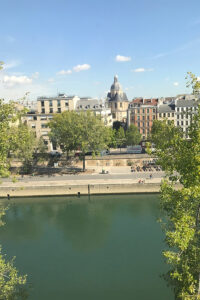Dr. Perry Myers Authors New Book Following Unique Sabbatical in Paris
Related Posts
Connect With Us
The Albion College German professor explores Spiritual Empires in Europe and India.
November 12, 2021
Dr. Perry Myers talks about his research in France and his new book.
By Jake Weber
Somewhere in the quarantine experiences of the past year and a half, there had to be the occasional positive story—and Dr. Perry Myers, professor of German, found one while spending the 2020-21 academic year in Paris.
“The mayor of Paris turned a lot of the main thoroughfares into bicycle lanes,” he says, explaining that this change helped reduce crowds in the Metro subway. “I had a dedicated bicycle lane from my apartment to my office, and every day I rode along the Seine past Notre Dame. I felt like I had to pinch myself to make sure this was really my life.”
It was a different experience than they anticipated, but Myers and his wife, Susanne (an adjunct instructor of French and German courses for Albion), were able to spend Myers’ sabbatical in Paris, where he finished the French sections of his book Spiritual Empires in Europe and India: Cosmopolitan Religious Movements from 1875 to the Interwar Era, released this week from Palgrave Macmillan, Cham. Myers’ sabbatical was supported by a fellowship from the Institut d’Études Avancées de Paris, which provides housing and a stipend to a select handful of scholars each year.
Myers is no stranger to the tremendous value of internet-based research and collaboration. Just as clearly, he knows their limits, and this is why the year in Paris was so necessary.
“Being in Paris really improved the sections of my book that dealt with France,” he says. “I had access to the archives and materials that just aren’t available from the U.S. I met French historians and specialists who gave me a lot of insights. That was important because I’m not a French specialist.”
Perry and Susanne’s original hopes for traveling throughout Europe (and especially to visit Susanne’s German family) disappeared into the months-long lockdown in Paris. They couldn’t travel more than 1,000 meters from their apartment (on the Institut campus) during November and December 2020, but they were still able to enjoy their little slice of Paris.

Myers’ view of the Seine from his Paris office window.
“The small food shops and bookstores were classified as essential businesses—you couldn’t go in or eat there, but you could buy all sorts of prepared food,” Myers recalls. “Freshly baked bread was available at all the bakeries, and a couple of times I bought bread that was so hot, I had to switch it from hand to hand when I carried it home.”
And while Myers was grateful for the grant that underwrote his work, he credits Albion’s support for getting it started.
“I used faculty development grants to make short research trips to London, Berlin and France,” he explains. A significant amount of my material on India I wouldn’t have found anywhere outside of the British Museum. These ‘Albion’ research trips enabled me to write a proposal that was attractive to the granting organization.”
This support was critical to Myers’ successful finish to the book project. But, he notes, Albion also benefits from his efforts.
“The people who got the grant with me were from Harvard, Berkeley, Oxford and other top universities in the world. And here I was, from Albion College,” he says. “It helps make Albion faculty competitive in a really competitive environment of scholarship. We’re right there with those ‘best’ institutions.”